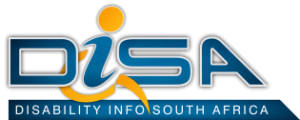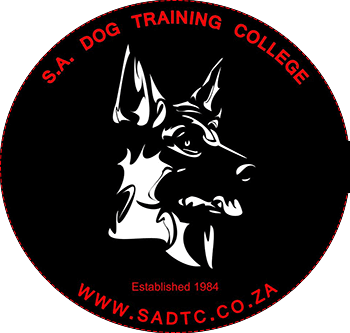Guide Dogs & Equipment
Introduction
"Assistance or Service Animals are defined as animals that are individually trained to work or perform tasks to assist persons with disabilities." There are a variety of different types of animals that can be trained as Assistance Animals, these include but are not limited to Monkeys; Miniature Horses and Dogs. The only Assistance Animal that is currently used and trained in South Africa, are "Assistance or Service Dogs," these Assistance Dogs come in all shapes, sizes and breeds and also include mixed breed dogs. Assistance Dogs are trained by Accredited training companies and organisations such as Smart Service Dog, Paws4life Training Academy, Honey’s Garden For Medical Alert Dogs SA and The S.A. Dog Training College. Through this training that both the dog and handler receives from these companies and organisations above, the dog will learn how to provide assistance to their handler and the handler will be required to train with their dog to learn how to communicate with their Assistance Dog.
There are various types of Assistance Dogs that are trained in South Africa to assist persons with various disabilities or impairments, these include Assistance Dogs that can assist persons with:
- Diabetes or Mobility Impairments - These are known as Diabetic Alert Dogs or Service Dogs respectively and can help persons with Diabetes, or those who use wheelchairs, or need assistance with balance.
- Visual Impairments - These are known as Guide Dogs and are used to guide people who are blind, or those who have Visual Impairments.
- Hearing Impairments - These are known as Hearing Dogs, or Alert Dogs, they can alert persons who are Deaf or those who have Hearing Impairments.
- Intellectual Impairments - There are a variety of different types of Assistance Dogs that can assist persons with Intellectual Impairments including, Autism Support Dogs; Psychiatric Service Dogs and Seizure Alert Dogs which alert and protect a person who is having a seizure, reminding a person with mental illness to take prescribed medications, etc.
- Therapy Pets/Dogs - A Therapy Dog or Therapy Pet is a dog that is trained so that they can provide affection, comfort and support to people in settings such as hospitals, retirement homes, nursing homes, schools, libraries, hospices, or disaster areas.
Assistance Animals are working animals, not pets, the work or task that an Assistance Dog has been trained to provide must be directly related to the person's disability or impairment.
On the page below we will list and discuss these different types of Assistance Dogs that can assist persons who are Blind or have Visual Impairments; The companies, organizations or individuals that specialize in training these different types of Assistance Dogs in South Africa; The equipment that is required by law to be worn by these Assistance Dogs and the rules and regulations regarding access to Assistance Dogs in public places and on public transport.
Types of Assistance Dogs
An Assistance Dog should have a good temperament, good health (physical structure and stamina) and be obedient and capable of being trained. Labrador Retrievers, German Shepherds, and Golden Retrievers are 3 of the most common breeds used as Assistance Dogs, but any breed or mix of breeds of dogs are capable of becoming an Assistance Dog if they have the above qualities. Some Assistance Dog training organizations or companies, however only train specific breeds of dog and dogs that they themselves breed. An example of this, is The South African Guide-dogs Association for the Blind, while companies and organisations such as Smart Service Dog, Paws4life Training Academy, Honey’s Garden For Medical Alert Dogs SA and The S.A. Dog Training College can guide you and help source suitable dogs that can be trained by them as Assistance Dogs.
Assistance Dogs can be trained to assist with persons with Visual Impairments or who are Blind in a variety of different ways, including:
- Guide Persons who have a Visual Impairment or are Blind: Guide Dogs
- Increase Mobility for Persons with Mobility Impairments, or who have a Visual Impairment or are Blind: Mobility Assistance Dog
Other Benefits of Owning an Assistance Dog
Studies show that owning an Assistance Dog also provides positive effects psychologically, socially, and physiologically, they offer additional benefits to those listed above and generally also reduce anxiety, depression, and loneliness. Due to the support, security, and companionship that they offer, stress is reduced, which in turn improves cardiovascular health. “A number of studies identify pet ownership as a factor in improved recovery from illness and improved health in general”. Assistance Dogs also make it easier to get around, resulting in the person getting more exercise or walking more often. People are generally more willing to go out and therefore feel a sense of independence, as they meet more people. Socializing becomes easier, as Animals lead to increased interaction with other people. In many cases, Assistance Animals offer a life changing experience and owners of Assistance Animals share a special bond with their animal, they are even sometimes referred to as a member of the family. It is however important to remember that Assistance Animals are working animals and should not be distracted while they are working.
Companies & Organisations That Can Assist
Assistance Dogs are required to be trained by an accredited training facility which will not only teach you how to train your Assistance Dog to assist you, but will also assist you to train your dog to behave well while out in public. There are various organizations, companies and individuals in South Africa, who are accredited and specialise in Assistance Dog training, this includes the Smart Service Dog, Paws4life Training Academy, Honey’s Garden For Medical Alert Dogs SA and The South African Dog Training College (SADTC). Some organizations and companies such as the South African Guide-dogs Association for the Blind, also breeds and provides the dogs that are trained as Assistance Dogs.
Training of an Assistance Dog can take months or even years to complete, this is to ensure that the Assistance Dog can assist its handler and can be prepared to accompany them on airplanes, buses, boats and into restaurants as well as other public places, without being distracted by strange noises, crowded areas, etc. Once the Assistance Dog has qualified, it will be registered with that organization or company on their data base and a letter or card, as well as a jacket or bib will be presented to the handler, stating that the Assistance Dog has been trained and qualified with them.
Please read the information below to find out more about these companies and organisations that provides this training and to find out more about the other services that they can provide.
Smart Service Dog
Smart Service Dog, is a Dog training facility in Durban that specializes in Puppy and Home Obedience Training. In 2016 Smart Service Dog became an independent training school and started focusing not only on Puppy and Home Obedience Training but, very importantly training The Handler, Owner and Dog Trainers as well. Our courses at present include but are not limited to the following: Dog Classes: Therapy Dogs; Puppy School; Home Obedience; Fun Agility – Canine Hooper’s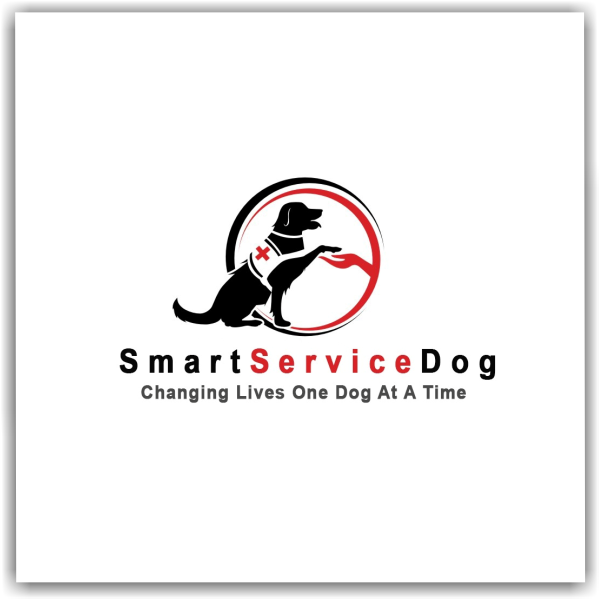 World Accredited; Scent Work- TDS accreditted; Animal Behaviour Training; CD Companion Dog-Working Trials; Canine Good Citizen Testing; Protection work and Rally Obedince Classes.
World Accredited; Scent Work- TDS accreditted; Animal Behaviour Training; CD Companion Dog-Working Trials; Canine Good Citizen Testing; Protection work and Rally Obedince Classes.
Animal-Assisted Therapy is a therapeutic intervention that incorporates animals, such as horses, dogs, cats, pigs, and birds, into a treatment plan used to enhance and complement the benefits of traditional therapy. It can be a useful intervention for individuals or groups and various studies have reported positive outcomes and improved emotional well-being in those with autism, medical conditions, or behavioral issues, as well as those battling illnesses like depression, schizophrenia, or addiction.
Smart Service Dog Training Centre train in five main fields these include: Autism Assistance; Psychiatric Service Dogs; Seizure Alert Dogs; Hearing Assistance and Mobility Assistance.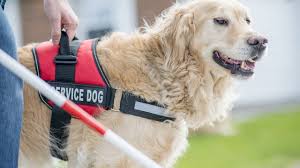
Mobility Assistance: A Mobility Assistance Dog enables his recipient to be more mobile whether they are in a wheelchair, or use a walker, cane, or crutches. These dogs allow their handler to be more independent in day-to-day life. Little Angels will not only train mobility assistance dogs for adults, but also for children who demonstrate the ability to remain consistent with training exercises and are able to communicate clearly to the dog.
Should you have any queries please feel free to contact Smart Service Dog via either the contact form on the website: www.smartservicedog.co.za, or email Grant Smith on: grant@smartservicedog.co.za, or contact him on mobile: 081 270 4672.
Honey’s Garden For Medical Alert Dogs SA
Honeys Garden is a nonprofit, 2016/387235/08 organization whose mission is to place quality service dogs with people within South Africa who are under privileged, fighting with disabilities or diseases, and veterans who have lost use of limbs or hearing. We also help with animal rescue and educate the public regarding use of service dogs in public places. We enrich the lives of children and adults with medical disabilities and diseases by matching them with task trained service dogs. We also supply and utilize specifically trained TheraPets for working professionals and individuals. We are the first company to train Medical Service Dogs in South Africa! All of our Service Dogs and Therapets undergo stringent testing, including the KUSA Canine Good Citizen Award.
supply and utilize specifically trained TheraPets for working professionals and individuals. We are the first company to train Medical Service Dogs in South Africa! All of our Service Dogs and Therapets undergo stringent testing, including the KUSA Canine Good Citizen Award.
Honey’s Garden For Medical Alert Dogs SA is run by Lucy Breytenbach (Director/Founder) and is enriching the lives of families across the country by providing quality task trained service dogs. We aim to increase the confidence and independence of those in need, and their families. We have successfully introduced medical service dogs, and Therapets for working facilities into South Africa. Our dogs save and change lives on a daily basis.
The dogs that we are currently able to provide include but are in no way limited to:
- Multipurpose Assistance Dogs –Every person and child is different and so are their needs. It is for this reason that we have developed “Multipurpose Service Dogs” who will generally assist in any way that is needed based on a detailed interview and home review (can be via video call). Some examples of the types of people who may need a multipurpose service dog include but are certainly not limited to: Adult Asperger, Down syndrome, Cerebral Palsy, Individuals who are medically frail. (Includes but not limited to a variety of disabilities. E.g. Foetal Alcohol Syndrome / Aspergers / ADHD / Mobility impairments / Alzheimer’s / Cerebral Palsy).
Whatever your needs, we can tailor train a dog to match them. Although you can give us a shout if you are unsure of what you would need a dog to do, here are a few ideas: Retrieving dropped items; Retrieving specific items (keys, phone etc); Opening, closing or holding open doors/fridge/cupboards; Tugging clothing to help remove; Turning lights on and off; Placing items in the bin; Deep pressure therapy; Retrieving medication; Carrying shopping bags; Alerting or interruption of repetitive behaviours; Assisting with walking up or downstairs or standing up; Reminding handler of lifestyle tasks (flushing toilet/locking house etc); Placing items in a trolley or onto a cashiers desk; Opening and closing curtains; General comfort; General entertainment and facilitation of daily routine and exercise; Pushing buttons for various reasons; Reading therapy; Interrupting a tantrum or providing calm stability after a meltdown
Prevent child from running away (tethering and anchoring); Lift legs to raise blood pressure or nudge into recovery position if handler unconscious. - We also assist with the training of: Psychiatric Service Dogs; Diabetic Alert Dogs and Hearing Dogs for the Deaf.
- TheraPets (Facility Dogs) (Our own or workplace orientated.)
Our training takes place at our facility in Cape Town, as well as out and about in local public spaces. This is so that we build confident reliable dogs who can work in any environment that they are placed in. We are able to place dogs across the country as long as families are able to attend an initial meeting or facilitate a video interview (to discuss needs and lifestyle so that we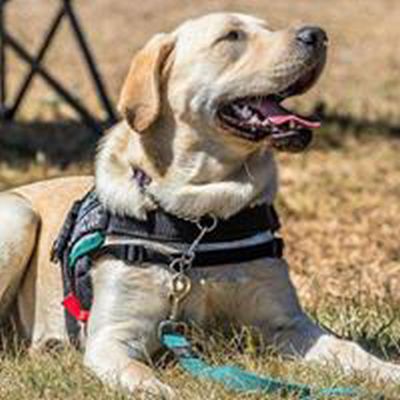 can match the perfect dog to their team), and spend 2 weeks at our facility upon completion of their service dog. This 2 week full time workshop will enable applicants to learn what is expected of them, and how to handle their service dog when they get home.
can match the perfect dog to their team), and spend 2 weeks at our facility upon completion of their service dog. This 2 week full time workshop will enable applicants to learn what is expected of them, and how to handle their service dog when they get home.
We carry out a graduation ceremony for the dogs and new owners upon completion of their public access test (near end of workshop). All families will leave with their dog and a starter pack with notes, information and goodies to get them started at home. We suggest that service dog teams join a weekly obedience school in their local area (we will gladly assist in sourcing a quality training school) in order to maintain confidence when working with their dog. We are also available to take questions and troubleshoot via video call should you require it, and you are always welcome to pay us a visit or join our local classes in Leadville Dog Park, Leadville Way Sunningdale, Cape Town, 7441, or contact Lucy Breytenbach on Mobile: +27 72 250 0336, via Email: honeysgardensa@gmail.com, or through their website at: www.medicalalertdogs.co.za.
South African Guide-dogs Association for the Blind
South African Guide-dogs Association for the Blind trains dogs to assist persons with disabilities such as blindness, to help them get from point A to point B using an Assistance Animal, thus making it much faster and safer. These specially bred dogs are ready and able to perform a variety of basic tasks designed to bring independence to assist a person with a disability. Training procedures are highly specialized, as the dogs are trained in a variety of environments, including shopping malls, restaurants and other public places to prepare them for working in all types of situations.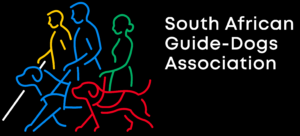
Coming from carefully selected pedigreed stock, as puppies they are placed in volunteer homes, “Puppy Raisers”, to begin their first stages of training. After 12-14 months with the Puppy Raiser, the pup returns to the Training Centre to start with approximately six months of advanced training. The skills and personalities of the dogs are thoroughly evaluated by the training staff, and each dog is matched and very carefully assessed before being placed to assist a person with a disability.
Before the Guide Dog can be placed with an applicant they need to demonstrate that they are unable to perform certain daily tasks that a dog can perform for them. No person is the same but by getting to know each persons individual circumstances assists us assess whether or not an Assistance Dog might be an appropriate option for them. If your Guide Dog application is accepted, you are eligible to receive a Guide Dog and training and can expect to pay a fee of R205 for your trained Guide Dog.
Once your Guide Dog is in your care, you agree to care for it humanely and follow South African Guide-Dogs Association for the Blind’s guidelines about the ongoing training of your Guide Dog. Training is as important for the prospective owner as it is for the dog, as the training of the dog will quickly break down if it is not handled and managed properly.
At the end of the training course an Instructor returns home with the newly qualified Assistance Dog Owner and helps the Assistance Dog and it’s master to settle down to their new life together. The Training Centre will keep in touch with the Assistance Dog Owner with regular visits throughout the dog’s working life to help maintain safe and competent standards. Instructors are always on call to help in an emergency or if unforeseen problems arise.
The South African Guide-dogs Association aims to provide Assistance Dogs for as many suitable people as can use them safely, and who completes the training programme successfully. If require a Guide Dog, please feel free to contact the S A Guide-Dogs Association for the Blind via one of the 3 branches below:
Head Office: Gauteng - 126 Wroxham Road, Paulshof, Sandton; Email: info@guidedog.org.za, Tel: 011 705 3512; Emergency Contact Number: 072 835 4718.
Western Cape Office: De Villiers House - 89 Belvedere Road, Claremont, Cape Town, 7708; Tel: 021 674 7395.
KwaZulu-Natal Office: Email: AneR@guidedog.org.za, or visit the website: www.guidedog.org.za
Therapy Dogs/Pets
A Therapy Dog or Therapy Pet is a dog that is trained to provide affection, comfort and support to various people in settings such as hospitals, retirement homes, nursing homes, schools, libraries, hospices, or disaster areas. In contrast to Assistance Dogs, which are trained to assist specific patients with their day-to-day physical needs. Therapy Dogs are required to be certified and are trained to interact with all kinds of people, not just their handlers.
Therapy Dogs should be calm and social with strangers and should be able to adjust to loud noises and fast movements, they are tested on behaviors such as not jumping on people and being able to walk on a loose leash. Exact testing/certification requirements differ based on the organization's requirements. Some organizations offer classes such as "distraction-proofing," which strengthens the dog's ability to focus and Therapy Training, to help prepare the dog and the dog's owner for Therapy Visits.
Therapy Dogs are not limited to a certain size or breed, common breeds used in Therapy Dog application and research include the Golden Retriever and the Labrador Retriever, while Cavalier King Charles Spaniels are considered natural Therapy Dogs since they were bred to be companion dogs and love meeting new people including children, are very gentle, and are eager to sit on a someone’s lap for long periods of time and are small enough to do so. Therapy Dogs offer many benefits to people and patients, including encouraging people and patients to participate in physical activities and they help encourage them to have cognitive, social, and communication goals.
There are various organizations, companies and individuals in South Africa, who are qualified to train Therapy Dogs such as the The South African Dog Training College (SADTC), Smart Service Dog, Honey’s Garden For Medical Alert Dogs SA and Paws4life Training Academy. These organizations and companies also offer programs, whereby they visit hospitals, retirement homes, nursing homes, schools, libraries, hospices, etc. to provide support. Please read the information below to find out more or to contact them:
The South African Dog Training College (SADTC): We have a therapy tester, and two therapy handlers, of which one is also a therapy instructor. They are qualified with DELTA, an international therapy organisation. We also offer training and testing right here in South Africa, as are internationally endorsed with the Delta Society. Instructions and evaluations are now conducted locally, Christine van der Westhuizen is an accredited alternate evaluator for Delta® and is conducting the local evaluations in the Gauteng Area. You can contact Christine on: info@sadtc.co.za or speak to her on: Tel: 065 860 6784, if you require any further information, or visit their website at: www.sadogtraining.co.za
Paws4life Training Academy: Therapy Dogs and their handlers go through various types of training to be able to qualify oncethey pass all the testing and assessments. Please feel free to contact Calika Morries from Paws4life Training Academy on Phone: +27 72 445 4310 or via Email: paws4lifetraining@gmail.com or visit the website at: www.paws4life.co.za, If you require any further information or are interested in Therapy Dog Training, becoming a handler, or require Therapy Visits to hospitals, retirement homes, nursing homes, schools, libraries, hospices, or disaster areas.
to be able to qualify oncethey pass all the testing and assessments. Please feel free to contact Calika Morries from Paws4life Training Academy on Phone: +27 72 445 4310 or via Email: paws4lifetraining@gmail.com or visit the website at: www.paws4life.co.za, If you require any further information or are interested in Therapy Dog Training, becoming a handler, or require Therapy Visits to hospitals, retirement homes, nursing homes, schools, libraries, hospices, or disaster areas.
Honey’s Garden For Medical Alert Dogs: Lucy Breytenbach (Director/Founder) - “Animals are my passion and my life, and I truly believe that dogs are one of Gods special gifts to us. It is known that dogs have the capability to comfort and protect people and that they are truly “man’s best friend”. Dogs will naturally console people, improve mental health and ultimately give unconditional love. Pets have been used as therapy for years, the lessons they can teach us are endless. We enrich the lives of children and adults with medical disabilities and diseases by matching them with task trained service dogs and also supply and utilize specifically trained TheraPets for working professionals and individuals. All of our Service Dogs and Therapets undergo stringent testing, including the KUSA Canine Good Citizen Award. Please feel free to contact Lucy Breytenbach on Mobile: +27 72 250 0336, via Email: honeysgardensa@gmail.com, or through their website at: www.medicalalertdogs.co.za. If you require any further information or are interested in Therapets, becoming a handler, or require Therapy Visits to hospitals, retirement homes, nursing homes, schools, libraries, hospices, or disaster areas.
Smart Service Dog: Animal-Assisted Therapy is a therapeutic intervention that incorporates animals, such as horses, dogs, cats, pigs, and birds, into the treatment plan. It is used to enhance and complement the benefits of traditional therapy. Animal-Assisted Therapy can be a useful intervention for individuals or groups. Studies reporting on Animal-Assisted Therapy found positive outcomes and overall improved emotional well-being in those with autism, medical conditions, or behavioral issues and it can be helpful for those battling illnesses like depression, schizophrenia, or addiction. Contact Smart Service Dog via either the contact form on their website: www.smartservicedog.co.za, or email Grant Smith on: grant@smartservicedog.co.za, or contact him on mobile: 081 270 4672.
Alternatively Contact Us for more information.
Equipment Used by Assistance Dogs
In South Africa the law states that Assistance Dogs are allowed in public places such as buildings, restaurants on boats or airplanes, etc., where animals are normally not allowed. They are however required to wear certain equipment while out in public, which includes Assistance Dog Vests / Bibs and Harnesses. This equipment may differ between companies and organisations and according to the type of Assistance Dog that they are qualified as. Assistance Dogs that are in training often wear different colour bibs according to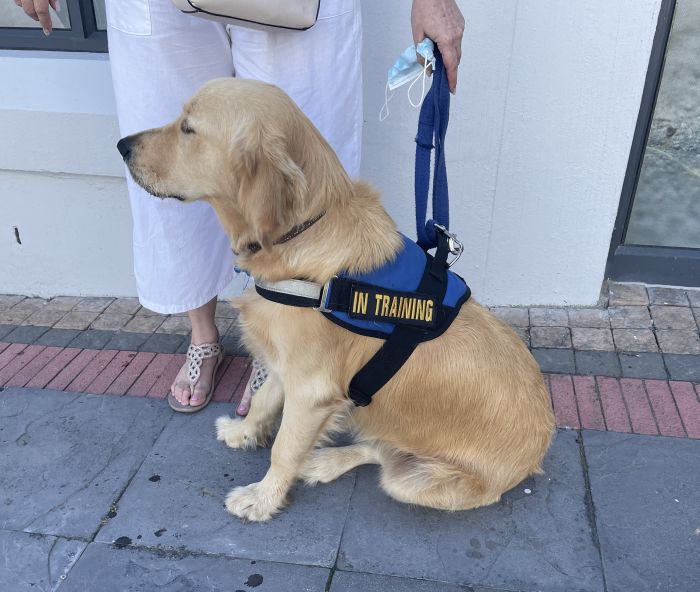 their level of training. These bibs and a variety of other equipment is available to purchase from the various organizations and companies that are accredited to train Assistance Dogs such as the The South African Dog Training College (SADTC), Smart Service Dog, Honey’s Garden For Medical Alert Dogs SA and Paws4life Training Academy. In most cases the training facility that assists you to train your Assistance Dog, will also supply you with a letter or card stating that your Assistance Dog has been trained by an accredited training facility. This letter/card is essential in-case someone objects to you entering their premises with your Assistance Dog. Access Poster - The S A Guide-Dogs Association for the Blind.
their level of training. These bibs and a variety of other equipment is available to purchase from the various organizations and companies that are accredited to train Assistance Dogs such as the The South African Dog Training College (SADTC), Smart Service Dog, Honey’s Garden For Medical Alert Dogs SA and Paws4life Training Academy. In most cases the training facility that assists you to train your Assistance Dog, will also supply you with a letter or card stating that your Assistance Dog has been trained by an accredited training facility. This letter/card is essential in-case someone objects to you entering their premises with your Assistance Dog. Access Poster - The S A Guide-Dogs Association for the Blind.
Unfortunately there is still some confusion from the public, including various restaurant and business owners who are not familiar with the regulations regarding Assistance Dogs. Up until recently there has not been any national registration process that registers Assistance Dogs in South Africa, however various companies/organisations have their own data base which they register their Assistance Dogs with. It is also believed that there is a company that are in the early stages of developing a registration process. Please Contact Us for more information.
Regulations & Rulings
As mentioned above, there are various regulations in-place regarding Assistance Dogs in South Africa and the access of Assistance Dogs into public places and buildings, where animals are normally not allowed.
An Assistance Dog is a working dog not a pet, they are essential to assisting many person with disabilities. Denying access to a person with a working dog is a form of discrimination and is against the law in South Africa. It should be viewed as the same as disallowing entry to a person who uses a Wheelchair or White Cane. Unfortunately many South Africans are still unaware of what an Assistance Dog does and how much training they have gone through to ensure that they are well socialised and behaved in public places.
Access Rights of Assistance Dogs
The Constitution of South Africa states that a person cannot be discriminated against due to their disability, which means that persons with visual, physical, hearing or intellectual impairments cannot be denied access to public places such as restaurants, retail environments, airports etc. due to the fact that they are accompanied by an Assistance Dog that has been trained by an accredited training facility.
Section 9 of the Equality Act in South Africa states that: No person may unfairly discriminate against any person on the ground of disability, including:
a) Denying or removing from any person who has a disability, any supporting or enabling facility necessary for their functioning in society;
b) Failing to eliminate obstacles that unfairly limit or restrict persons with disabilities from enjoying equal opportunities; or
c) Failing to take steps to reasonably accommodate the needs of such person.
This also applies to restaurants or shops that sell food: Establishments within the food industry are regulated by the Foodstuffs, Cosmetics and Disinfectants Act which states the following:
"In terms of the Foodstuffs, Cosmetics and Disinfectants Act, No. 54 of 1972 (“the Foodstuffs Act”) and regulation R962 (10)(i) governing general hygiene requirements for food premises and the transport of food, no animal, subject to the provisions of any law, is to be kept or permitted in any room or area where food is handled, except for guide dog accompanied by a blind person, who may be permitted in the sales of serving area of the food premises."
It is submitted that the provision logically extends to working dogs who are Service Dogs in the areas of Autism or Service Dogs required for persons with disabilities (other than blind persons) on the basis of the principles discussed above in relation to the Equality Act and Constitution.
Rulings With Regards To Access Rights of Assistance Dogs:
In terms of the above mentioned legislation, should you refuse access and/or service to a person with a disability with their Guide Dog, Service Dog or Autism Support Dog, appropriate recourse in the Equality Court or other appreciate forum may be sought against you and your company. We are covered by the South African Constitution and the United Nations Convention on the Rights of Persons with Disabilities (UNCRPD). Earlier this year, Judge Saldanha handed down a landmark judgement, the first in South Africa with the denial of access of a working Guide Dog.
The S A Guide-Dogs Association for the Blind (GDA) will advocate for the access rights of persons with disabilities who use a working dog that has been professionally trained by the Association (or any working dog trained by a member organization of the International Guide Dog Federation or a member Organisation of Assistance Dogs International). GDA will assist people who use working dogs to take advantage of the legal rights that they are entitled to. Alternatively please feel free to contact us via Yes to Access or fill out our Complaints Form.
South African Guide-dogs Association for the Blind:
- "Access Rights for Assistance Dog Owners" - Provided by South African Guide-dogs Association for the Blind.
- Is it Illegal to Deny Access to a Working Dog? - www.Guidedog.org.za
Links to the legislation:
